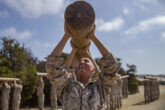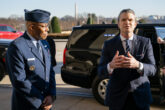August 27, 2020
Developing Leaders to Promote Gender Integration
A Policy Brief From the Athena Leadership Project
In December 2015, then-Secretary of Defense Ashton Carter opened all military occupational specialties (MOSs), rates, and ratings to women, removing the so-called “combat exclusion” policy. As part of the policy, each of the military services was charged with creating a Gender Integration Implementation Plan detailing the processes and procedures that would be employed to open previously closed positions to women. A central tenet to the services’ integration plans was ensuring that service members had to meet relevant, transparent, and gender-neutral standards for all occupational specialties. While the intent of the requirement was to ensure that women were given an equal opportunity to pursue any career path, the focus of these gender-neutral standards became physical ability, creating unintended barriers for the full and meaningful integration of women. In this policy brief we present three recommendations that address and offer solutions to overcome these unintended barriers to women’s integration.
Focus groups conducted by the Defense Advisory Committee on Women in the Services since the 2015 announcement have identified that male and female service members alike demonstrate a consistent belief that the creation of gender-neutral standards actually lowered existing standards to enable women’s integration into previously closed MOSs. Though false, this belief hinders military integration plans, perpetuating the stereotype that the presence of women lessens the overall effectiveness of a unit. This stereotype stems from and reinforces a broad range of gender-based stereotypes that frame women as ill-suited to military service due to physical size, stature, and characteristics that are deemed feminine in composition and “natural” to all women. The framing of women as a bloc as ill-suited for leadership and service is layered and complex, but the standards discussion has long served as a manifestation of the unconscious bias that underlies much of the integration process and ultimately hinders effective employment of a fully integrated military.
The consequences of these stereotypes—in particular, the belief that integration leads to lower standards—are observed in a drumbeat of dissent to integration that has permeated, despite official statements on the necessity of women’s participation and several high-profile stories of women’s success. These consequences can be seen in continued problems with gender-based harassment and assault as well as prominent voices continuing to question the viability or benefit of women’s integration.
One of the goals of the Athena Leadership Project is to move the discussion of women’s integration beyond “whether” women should be integrated (because we know they should be) to how to best integrate women to promote military effectiveness. A key aspect of military effectiveness is competent and capable leadership. In order to harness the unique abilities of all service members, military leadership must adapt not only to the changing global environment, but also the changing demographic makeup of the military. As women are becoming a more essential part of modern combat operations, military effectiveness will hinge not just on setting gender-neutral standards for combat MOSs, but in developing effective leaders who are conscious and engaged in growing a successful, diverse force and in harnessing the skills and experiences of all service members. Indeed, gender integration must move beyond discussions of physical standards.
A key aspect of military effectiveness is competent and capable leadership.
On April 16, 2020, the Athena Leadership Project held its inaugural event in conjunction with the Center for New American Security (CNAS). The virtual panel consisted of interviews with three active duty military officers spanning the O-5 and O-6 ranks, two women and one man, each with track records of leadership success in their chosen fields. By exploring their experiences and perspectives, and discussing how those experiences and perspectives shape operational success, we have developed recommendations that will help move gender integration plans forward. The following recommendations are meant to help military leaders be more effective at developing and implementing robust gender integration plans that lead to a more effective fighting force.
Create occupational standards that encompass more than physical requirements.
The focus on physical standards has increased divisions within the services. While the ability to perform specific physical occupational tasks is a necessary requirement, that ability alone is not sufficient to predict effectiveness. There is more to performance than just what is physically required to accomplish a manual task. Complex problem solving, mental endurance, diversity of thought, and cultural and emotional intelligence are examples of needed skills on today's battlefield, and their importance increases with leadership responsibility. Integrating these aspects into occupational standards will move the debate away from whether women are capable and pivot the discussion toward how women can succeed. It also will help dispel the damaging myth that standards were lowered to accommodate women and the stereotypes associated with that myth.
Define success in gender integration as more than simply the number of women in each specialty.
Success, as defined in Gender Integration Implementation Plans, is often tied to reaching a certain number of women in previously closed specialties. This “add women and stir” approach, however, does not promote integration. Rather, it breeds tokenism, isolation, and essentialization of the many skills that diversity brings. This, in turn, can discourage women from joining the military in the first place. Rather than focusing on counting the number of women, leadership must tie hard security outcomes to the benefit that women’s perspectives bring to the business of warfighting. For example, there is a robust literature on the role that unemployment, lack of access to clean water and food, educational disparity, and the rights of underserved and disadvantaged women and families play in the onset of conflict and war. Yet in the planning and conduct of military operations, these are largely dismissed as “women’s issues.” Characterizing these issues as outside of or subordinate to security priorities devalues the benefits of women’s perspectives to security while also undermining global security. Conversely, elevating these issues as a comprehensive part of the planning and conduct of war requires leveraging the unique perspectives that women bring to security while increasing global security. Defining success in gender integration in this more comprehensive way will both encourage more diversity in those joining the service and ensure that combat operations are more likely to meet their intended objectives of a more secure world.
Create a more inclusive understanding of effective leadership in doctrine, performance evaluation, and training standards.
Traditional images and visions of leadership are male-centric and rely heavily on stereotypically male characteristics such as upper body strength, decisiveness, bias for action, assertiveness, ambition. Women who display these characteristics can be viewed negatively for acting outside of acceptable norms. Further, women often are judged by their physical stature or feminine appearance to be immediately incapable of leadership, and skills stereotypically defined as “feminine,” such as empathy, willingness to listen, inclusion, open-mindedness, and humility are neglected or less purposely developed. Effective leadership and how it is considered in every aspect of military training, development, and execution needs to include attention to these skills along with physical strength and professional competency.
Diversity of lived experiences results in stronger leaders.
Additionally, women possess skills that transcend gender lines and expectations—women can develop more well-rounded skill sets from their military service because of the obstacles they face and the creativity they must exhibit to overcome them. Diversity of lived experiences results in stronger leaders who can challenge the assumptions of the status quo and implement more creative and effective solutions to tomorrow’s challenges.
Nearly five years after the creation of the Gender Integration Implementation Plans, progress has begun but has not yet reached a place where gender is truly integrated into military operations. By keeping these three suggestions in mind, leaders can move beyond the pitfalls of the focus on the physical and build a stronger, more resilient force.
About the Authors
Dr. Jeannette Gaudry Haynie is an Adjunct Senior Fellow in the Military, Veterans, and Society Program at CNAS, Executive Director of the Athena Leadership Project, an adjunct professor at Tulane University, and a career Marine Corps officer.
Dr. Kyleanne Hunter is an Adjunct Senior Fellow in the Military, Veterans, and Society Program at CNAS, Managing Director of the Athena Leadership Project, Assistant Professor of Military and Strategic Studies at the U.S. Air Force Academy, and a Marine Corps veteran.
More from CNAS
-
National Security Human Capital Program
Defending the Army’s Command Assessment ProgramThe concept for CAP — developed during the first Trump administration — benefited from the guidance, input and oversight from the foremost scholar and practitioner on military...
By Katherine L. Kuzminski
-
National Security Human Capital Program
‘Women Don’t Just Achieve…They Excel’: Fmr. Marine Corps Attack PilotDr. Kyleanne Hunter, former Marine Corps attack pilot and CEO of Iraq & Afghanistan Veterans of America, says “women are the fastest growing group of veterans” and “the fastes...
By Dr. Kyleanne Hunter
-
National Security Human Capital Program
Could the U.S. Bring Back the Draft?In this episode of At the Boundary, GNSI’s Dr. Guido Rossi sits down with Katherine Kuzminski, Director of Studies at the Center for a New American Security (CNAS), to explore...
By Katherine L. Kuzminski
-
National Security Human Capital Program
Hegseth Brings the Culture War to CombatThe fundamental challenge of military leadership lies in creating cohesive teams that can work together in an environment of mortal risk and, when called upon to do so, use le...
By Dr. Jason Dempsey




